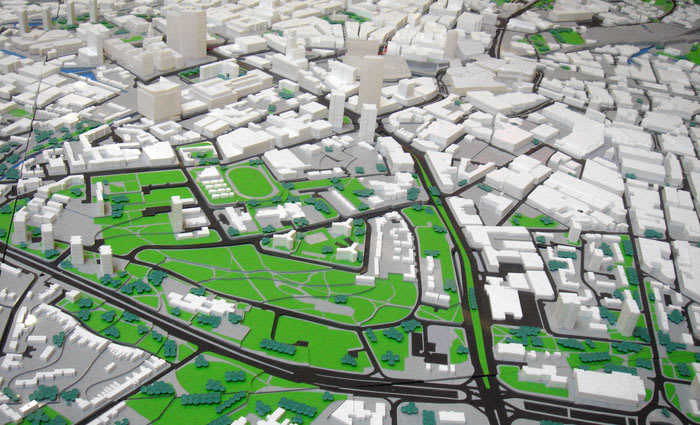What actually is a good city?
![]()
GUEST OBSERVER
Our cities have now been named as the saving places of a planet in crisis. And yet we cannot decide on the principles that make for a good city. Everybody has a view, but some views are more sustainable than others.
What we desperately need is a big and general public dialogue about the principles that make for a good city. This is the basis of our project, Principles for Better Cities, led by the City of Berlin. It provides a platform for the Ecocity World Summit in Melbourne this week.
Broader vision is needed
We need to get beyond the current tendency to become fixated on spruiking different high-level concepts. For example, IBM, Microsoft and Big Tech have put their money – or actually other people’s money – on the smart city.
But the concept of the smart city is too often reduced to narrow technological monitoring and big data collection. McKinsey says that a good city will achieve “smart growth”. But tell that to Brussels, Chicago, Montreal, Toronto and Vienna, global cities that are declining in size.
John Wardle group and The Economist tell us liveability is the key. However, they narrowly developed their indices for corporations seeking to decide on how much they will pay their executives for moving to less liveable cities. This raises a further question: “Liveable for whom?”
The Rockefeller Foundation is backing the resilient city. This too is an important concept. But much of its appeal to governments is in saving resources as they seek to defer increasing climate risks through pushing responsibility back to resilient communities to self-manage their recoveries.
A common problem of definition
What actually is a good city then?
Depending on who you ask, they are sustainable cities, liveable cities and resilient cities, but they are also adapting cities and carbon-neutral cities. Or they are caring cities, inclusive cities, just cities, peaceful cities, information cities and networked cities. To confuse things further, they are also prosperous cities, learning cities and innovative cities.
Just by listing these urban forms, the problem starts to become clearer. These are just concepts with shifting or weak definitions. They mean anything “good” and apply variously to anybody’s projections.
The second problem comes with deciding what is actually good about these different emphases.
As part of this difficulty, assigning different indicators to each of these urban forms is extraordinarily difficult. Is a city more liveable because it has a Mediterranean climate? That is what the current liveability indices would suggest.
Is a city more resilient because its “man-made assets” are more robust? (Excuse the gender-specific language here.) That is what the core resilience literature tells us.
Who decides?
The third problem centres on the question: “Who decides what is good?”
The principles and indicators tend to be decided by elite researchers working at a distance from the field, or by teams using sets of secondary data that may or may not be appropriate.
Elite teams develop black-box indicator sets (such as liveability indexes) that remain commercial-in-confidence. The data drive the index construction without consideration of the meaning of that data. For example, one index ranking better cities in the greater Sydney region is driven by an indicator that suggests a key consideration is being closer to the beach or mountains.
The fourth problem becomes how do we order and prioritise the many claims about what is good. There are so many considerations that the number of potential principles becomes overwhelming.
This happened to the New Urban Agenda, developed by the United Nations over the last two years. It has hundreds of principles, all thrown together in an incomprehensible list. Cities are understandably confused.
Towards an inclusive, holistic approach
Our Principles for Better Cities attempt to respond to all these problems. Complementary to the New Urban Agenda, Principles for Better Cities is an initiative of the World Association of Major Metropolises, which has been working with cities on a set of basic principles to guide good urban development.
This set is based on the proposition that, rather than just adding together a list of proposals from different current or immediate concerns, the principles should begin from a general framework that concerns the human condition.
We start with the idea that there should be basic principles that relate to the following basic domains of social life:
Ecology – cities should have a deep and integrated relationship with nature.
Economics – cities should be based on an economy organised around the social needs of all citizens.
Politics – cities should have an enhanced emphasis on engaged and negotiated civic involvement.
Culture – cities should actively develop ongoing processes for dealing with the uncomfortable intersections of identity and difference.
These have become the top-level principles for going deeper and deeper, elaborated across more and more specific subdomains of practice.
And here is the completely novel dimension. These principles have been and will be debated by people. None of these principles are fixed, hidden, confusing, or commercial-in-confidence. They are the outcome of open dialogue.
Professor of Globalization and Cultural Diversity, Western Sydney University.
Project officer – Ecocity, Melbourne Sustainable Society Institute, University of Melbourne.
Director, Melbourne Sustainable Society Institute, University of Melbourne.
Professorial Fellow, University of Melbourne.
All are authors for The Conversation.
